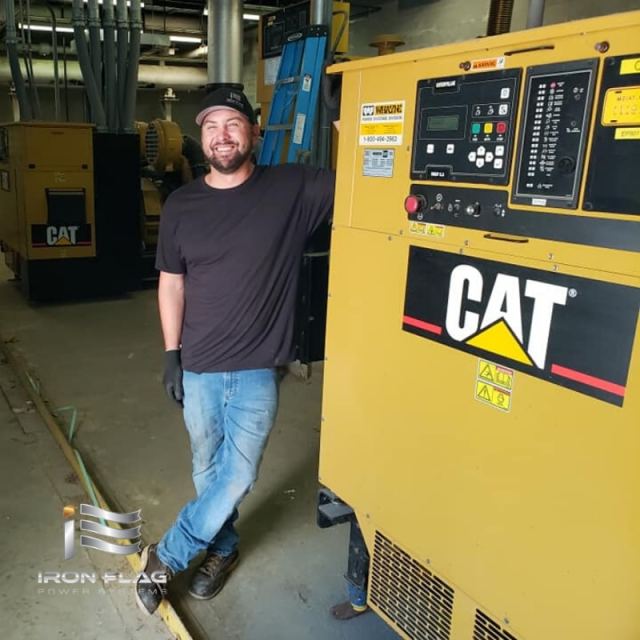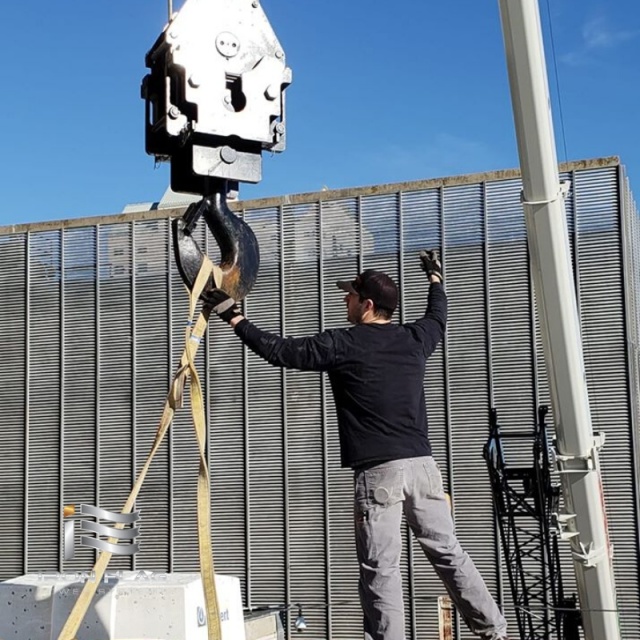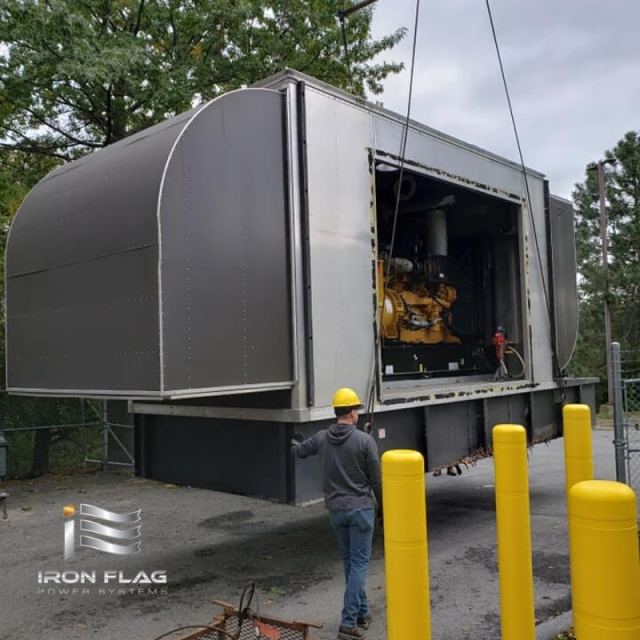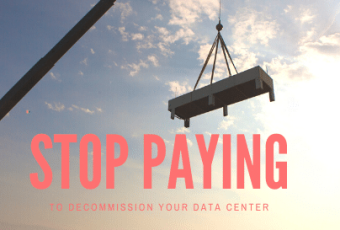

Director of Development
This guide is aimed at walking you through the major factors determining the value of a generator. With the help of the information below and a little market research, you should be able to land a ballpark number on the value of your generator. If you’re ready to skip ahead and get your first quote, use our Nifty Generator Valuator. It’s the easiest quote you’ll get, – it only takes about 20 seconds.
You might be a property manager and you’ve just bought an old data center, or maybe you’ve just inherited an old farm and you’re currently doing inventory. Whatever the case, you’ve just discovered a generator on the site, and it’s a big boy. This discovery comes with a mix of emotions – optimism that it might be worth some serious cash, and also a fear that it might be worthless and cost you a chunk of change to get rid of. This article aims at giving you some clarity on uncovering the value of your generator.
It is impossible to give a value without first analysing some of the major price influencers, which include condition, size, age, brand, and hours, in that relative order of importance. If some or several of these factors are unfavorable, the price tag can easily land at $0, and if you’re extremely lucky, your generator could have a value of upwards of $100,000+. But to set some expectations, realistically, most generators Iron Flag Power Systems comes across have a value in the range of $1,000 – $20,000. When digesting this price, keep in mind that we deal almost exclusively with larger generators.



The most important factor is whether or not the generator actually works. If it’s not in full working condition, you will be hard-pressed to find anyone willing to take the hunk of junk off your hands without paying them first. If you’ve been able to fire up your generator, then take a moment to celebrate – it’ll probably be worth at least a few bucks! Even if it’s not worth much, it’s still better than having to pay someone to haul it away. Most generator buyers are rightfully hesitant to buy something with the promise that “it just needs a simple part replaced”. They are afraid that even if the seller has the best of intentions, they may not be right about the true cost and depth of the rehabilitation needed. As you can imagine, a generator buyer does not want to spend $25k on a generator that they have to end up scrapping. Condition goes beyond just the binary question of “does it work or not” – condition also considers the current shape the generator is in. Has it been serviced over the years? Is it covered in rust? Has it been protected from rain inside a facility or with a housing, or has it sat outside in an open field for its lifetime? These are all just clues that generator buyers piece together to assess its overall condition, and its ability to continue working long after the purchase.
Summary: The generator must be working. If it was kept in good condition and regularly maintained, this will mean significantly higher value.
The easiest form in the industry. Open the conversation about your generator in just a few clicks.
The other easiest form in the industry. Open the conversation about your assets in just a few clicks.
Instantly explore the value of your generator. Plug in the numbers and this will spit out a value.
Bypass all the back-and-forths. Use this nifty little app to snap a few pictures and receive an official quote.
The next most obvious factor to consider is the size of your generator – which can vary from a few hundred watts to several orders of magnitude larger. A watt (w) is the standard unit of measuring electric output, but a watt is a small unit, and you more often see generators with a rating in kilowatts (kw), which is the equivalent to one thousand watts. Don’t be fooled by a generator with a fancy sounding name: an XP3000 might only be 3,000 watts, which equals 3 kw. On the larger end, you might find a generator rated in megawatts (MW), which is equal to a thousand kws (also equal to a million watts). A generator rated in MWs will be the size of a tractor trailer.
Generator dealers typically call anything less than 20 kws pretty small. Although this can be a very large generator for various applications – in terms of the scale and depth of the generator world, this is still a pretty small power output. A medium-sized generator would fall between 20kws and 100kws. A large generator would be 100kw to 500 kw, and 500kw+ would be considered very large. It is pretty rare to come across a generator more than 3 MWs.
So, as you can see, the size of your generator has a large influence on its value. Something that puts out 800 watts is on a completely different order of magnitude than one that puts out 800,000 watts. While we still can’t assign a value based on this factor alone, it should give you some general expectations when trying to discover the magic number.
Summary:
20 kws = too small for most generator dealers
20kw – 100kw = medium size.
100kw – 500kw = large size.
500kw+ = extra large size.
Ok, you’ve got a large working generator, and you’re feeling pretty good. The next thing to consider is its age. It is not uncommon to come across large generators from the 70s. I know it doesn’t feel like that long ago, but the 70s was an entire half century ago. You can imagine that finding a generator that is as old as the first moon landing might have a significant bearing on its overall value. Besides the fact that old parts wear out over time, there is another major reason to consider the date of manufacture: generators built after 2007 have a significantly higher value.
The short explanation is that in the 90s the EPA created a set of standards to regulate the emissions produced by generators, known as the “Tier Rating System”. These standards, which were put in place to protect our planet and our bodies from noxious gases, rates generators on a scale from tier 1 to tier 4 – the better the emission quality, the higher the tier. The system was slowly phased in over a decade, but ultimately resulted in a law that mandates that all generators built after 2007 adhere to tier 4 standards. If your old generator doesn’t meet these standards, you can still use it – it’s grandfathered into existence, but – and there’s a big “but” – if you ever move it, or even disconnect it, it cannot be reinstalled in a state that has higher generator tier standards, such as California. Lucky for you, not all states have fully adopted this commitment, which means that your generator can still be sold – but the lower the tier, the fewer states it will be able to be sold in, seriously lowering its value. If your generator was made in 2007 or later, it is almost certain that it can be sold in all 50 states, and will have maximum value.
Summary: Younger generators are worth more. A major cutoff point is the year 2007. Generators made after this date typically hold the most value because they are certain to hold a tier 4 rating, and can be installed in all 50 states.
As is true across many industries, brands carry a reputation, and the brand of a generator has a major impact on its value. There are a lot of brands on the market, but to offer a little clarity, we will shed some light on a few of the most common.
Caterpillar (aka CAT) generators are the absolute top of the line – if you have one of these babies, you’ve got something with some value on your hands. A few steps back sits the brands Cummins, Kohler, and MTU. These are solid, reliable brands that still hold good value. At the end of the pack you will find the brands Katolite, Olympian, and finally, Generac. These brands aren’t as reliable and can have a major damper on the value of your generator. Other brands certainly exist, and will fall at various points on the continuum, but many of the lesser known or distributed brands won’t offer much value. Don’t be surprised if you find that a 50kw CAT is worth a lot more than a 100kw Generac.
Summary: CAT is best, then Cummins, Kohler, and MTU. The lower-quality brands are Katolite, Olympian, and Generac.
The final consideration is the number of hours the generator was used. Every engine has a dial, similar to the odometer in your car, which tracks the amount of time it has spent operating. As you might expect, the lower the hours, the more valuable the generator. Has your generator been used as backup power and only turned on a few times over the years – or has it carried a heavy load on a regular basis? The hour meter will help tell this story. For scale reference, less than a hundred hours is pretty low, and we typically see generators under two thousand hours. 20,000 hours would be quite high.
Summary: Generators with low hours are best. Under two thousand hours is average, under a hundred is great.
Another critical factor when assessing the value of your generator is the additional services you might need when selling it. For example, it’s one thing to get a written agreement to purchase your equipment, and it’s another thing to actually move it. Pretty much any generator beyond a hand-held machine will require a crane to lift onto a truck, which isn’t cheap – typically a thousand dollar expense. Maybe you have equipment on site that can take care of the rigging, which would save you a good amount – but if this is not the case, and you are only able to sell your generator for $500, expect to take a loss on getting rid of this piece of equipment.
Other common generator-related services are electrically disconnecting the generator, which requires the assistance of an electrician, and removing the old fuel, which requires another specialized service. These additional expenses add up fast, and should be deducted from the value of your generator when calculating your profit. Sometimes generator buyers will provide this service, which saves you a major coordination headache, but will always still pass the cost onto the customer, which might be why you see a discrepancy in what different generator buyers will offer. Usually, full-service buyers are open to deducting the cost of these services if you can provide them yourself or want to make your own arrangements. These costs are often overlooked by new sellers, but are certainly a reality when buying and selling large equipment.
Summary: Expect anywhere between $1,000 and $2,000 in expenses to disconnect, move, and haul the generator if it is large.
I’m glad you brought this up! It’s certainly a great idea to do your research and find the list price of similar generators. Keep in mind that “similar generators” means something that shares common statistics in all five categories.
However, the notion that this can be used as grounds for an accurate valuation is actually a common misconception. First of all – think about it: if you can see the generator listed for a certain price, it means no one has bought it yet, and therefore no one thinks that it’s a price they’re willing to pay. Using the price of a generator on ebay as leverage is the same as seeing a baseball card being sold for $10,000 – maybe that’s the real value, or maybe it’s just a seller with unrealistic expectations, or even worse, someone fishing for a fool.
However, you might see this price on a generator dealer’s website. This does give you a better idea that the value is grounded in some reality, but unfortunately, it still is not an indicator that you can sell your generator for that same price. This is because when a generator dealer buys a used generator, they take on any risk with it, pay to rig it, haul it, repair it to a top-working condition, have it inspected and certified, and then they guarantee its performance. Then they rig and haul it again, and pay out all the employees who helped make it happen – so naturally their prices are going to be higher to reflect this cost. It is tempting to see what a dealer offers for a generator, but no one is going to buy one directly from the original seller at that price with no certifications, inspections, or guarantees.
Imagine instead, that you are trying to buy a used car on craigslist, and the seller is using the price of a similar car at a dealership as an indicator of its value. You’d be better off just buying from the dealership at that point – and they’d be lucky to get half the asking price for the car. Nothing against the car – it’s just that in terms of guarantees the dealership offers a lot more than the guy on craigslist does. So there’s going to be a big difference between what you see for sale online, and what you can actually get for it. Just like selling a car, you can try to cut out the middleman by listing on craigslist, but doing so can result in a major headache, or even a liability if you guarantee the performance of something that doesn’t deliver.
Summary: Definitely do your research and find the prices of similar generators for sale online, but keep in mind that you will likely get much less than the online source is asking.
As you can see, there’s a lot of factors working together which give your generator a value. A low score in even one of these categories can result in a disappointing valuation – but the degree to which each factor affects the final price varies widely. That being said, do not surrender to the first offer without doing your own research first. At the very minimum, find a trusted source with a trusted reputation that you know is not in the market to rip you off.
We highly recommend getting at least a few quotes before making a sale, but why don’t you make your first quote here. Iron Flag Power Systems is a trusted asset recovery service that can give you a fair price. The best part is: our Nifty Generator Valuator <below> only takes about 20 seconds to fill out, which is the guaranteed easiest one you will find in the US.
Best of luck navigating this process, I hope our honest and fair guide helped better prepare you to make smart and educated decisions.
The easiest form in the industry. Open the conversation about your generator in just a few clicks.
The other easiest form in the industry. Open the conversation about your assets in just a few clicks.
Instantly discover the value of your generator.
Bypass all the back-and-forths. Use this nifty little app to snap a few pictures and receive an official quote.


Iron Flag Power Systems is one of the only demolition companies in the nation who will actually pay …
Iron Flag has rolled out a whole set of tools to help you make educated decisions when navigating th…
In June 2021, Iron Flag Power Systems completed the decommissioning of Crawford Hoying’s 10,000 sq…
Learn about the NIIT Media Technologies decommissioned data center. Iron Flag Power Systems (IFPS) p…
Learn about the Miller Electric Company decommissioned data center. Iron Flag Power Systems (IFPS) p…
We’re happy to answer any questions. Contact us to learn more about how our services can help you.

Iron Flag Power Systems specializes in the recovery of electrical infrastructure. This includes Decommissioning Data Centers, Generator Recovery, and all other forms of Targeted Demolition.